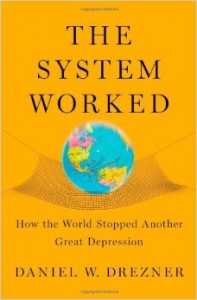 The System Worked was published earlier this year, bearing the tantalizing subtitle: How the World Stopped another Great Depression. I ordered it from the library after reading a New York Times review on it and several related books.
The System Worked was published earlier this year, bearing the tantalizing subtitle: How the World Stopped another Great Depression. I ordered it from the library after reading a New York Times review on it and several related books.
I have to admit it took some time to wade through it, in part because I returned my copy to avoid lugging physical books through Turkey, where I spent three weeks in October. But on my return, I borrowed it again and finished the book.
The author, Daniel Drezner, is a senior fellow at the Brookings Institution and a professor of International Politics at Tufts University. I found his prose somewhat dull but the ideas underlying them are worth mining.
U.S., Europe and China pulled together
In book publishing it’s probably harder to sell an upbeat title than a pessimistic one. (When was the last time a newspaper led off an issue with “No planes fell from the sky yesterday?”) And The System Worked is decidedly upbeat about how governments around the world coordinated their response to what could have been a global economic and stock-market disaster in 2008 and its aftermath. It credits this coordination primarily to the United States first and foremost, ably assisted by the Eurozone and China. Japan, it seems, slipped into a second tier throughout this struggle to avert what otherwise was shaping up to be another Great Depression.

The early chapters recap the common perception (a false one in the author’s view) that the system did NOT in fact work: this after Drezner lays out his case for why it did indeed work out splendidly. Those who claim otherwise cite specific trouble spots like the escalation of Europe’s sovereign debt crisis or the failure of climate-change negotiations. Here is a typical upbeat Drezner quotation:
“Even though the initial drop in output and trade levels was more acute in 2008 than in 1929, by any measure the global economy has rebounded more robustly over the past five years than it did during the Depression … The liberal economic order proved to be more robust than expected.”
Certainly, Drezner’s optimism has been justified through late November of 2014. Friday’s twin events of China cutting its interest rates and the ECB’s stimulus talks suggests that the world’s central banks continue to fight the good fight against deflation, depression and other horrors.
But can the system work for more than these first five years?
All of which makes the book’s final chapter all the more tantalizing. Entitled “Where do we go from here?” Drezner repeats his main theme when he says that on policy grounds, both TARP (Troubled Asset Relief Program) and the related Federal Reserve programs were “huge successes” in how they “greatly eased the credit crunch faced by the banks.” This despite the fact TARP “has remained political poison.”
Well, the skeptical reader may say at this point, we may have survived the first five years but can we keep it up? Drezner concedes “there are valid reasons to be concerned about the future.” There is still much fragility in the global economy and the Eurozone “has still not found a viable way to fix the internal imbalances between Germany and southern Europe.” A global recession is quite possible, he admits, and “there are a lot of ways in which things could go wrong” but “given what has happened since 2008, it is safer to conclude that they won’t.”
A big part of his faith is based on what he terms “the enduring strengths of the United States.” These include healthy demographics, geographical security, a dynamic pop culture and excellence in higher education and innovation. Add to that lower oil costs and the fact he believes America will be “the world’s leading oil producer some time before 2020.”
Meanwhile its chief rival, China, is reforming its development model so that “its domestic economy more closely resembles that of the United States.”
Drezner closes with the admission that in the world of international affairs punditry, pessimism sells. Nevertheless, he closes with this:
“Pessimism has spread just as widely as financial contagion did in 2008. It is wrong and needs to be corrected … Going forward, a healthy dollop of optimism is in order.”


